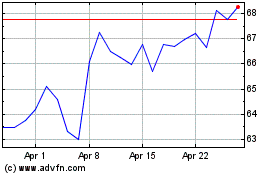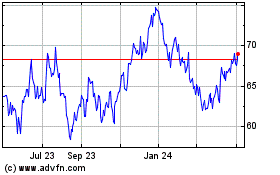As a member of the Panguna Mine Legacy Impact Assessment (PMLIA)
Oversight Committee, Rio Tinto today welcomed the release of the
PMLIA report as a critical step forward in building understanding
of the long-term legacy impacts of the former mine in
Bougainville.
The independent report assesses the environmental impacts and
directly connected social and human rights impacts caused by the
Panguna mine since Bougainville Copper Limited (BCL) ceased
operations in 1989.
Conducted by independent consultants Tetra Tech Coffey over the
past two years, the entire PMLIA process was overseen by the
Oversight Committee, which is made up of representatives from the
Government of Papua New Guinea, Autonomous Bougainville Government
(ABG), landowner and community representatives, BCL, Rio Tinto and
the Human Rights Law Centre (HRLC). The PMLIA involved
comprehensive field studies; extensive soil, water and food
sampling; hydrology and geo-morphology analysis; and in-depth
household surveys and interviews with community members.
The report identifies a range of actual and potential
environmental impacts, including unstable buildings and landforms,
mine-related flooding and sediment movement, contamination of soil
and water around some areas that were used for processing or
chemical storage, and also from waste rock and tailings. The report
describes how the environmental impacts are affecting or may affect
the human rights of residents living in these areas.
In November, Rio Tinto, BCL and ABG signed a Memorandum of
Understanding (MoU) to discuss ways forward. This group plans to
address the PMLIA findings and develop a remedy mechanism
consistent with UN Guiding Principles on Business and Human
Rights.
Ongoing and continuing efforts already underway to address
issues with ageing infrastructure, and other priorities identified
by the PMLIA, include an MoU signed in August by Rio Tinto, BCL and
the ABG for works on four sites that pose severe and imminent risks
to nearby communities. Rio Tinto is also in discussions with the
ABG regarding geo-technical hazards identified by the PMLIA, to
ensure that local communities and small-scale miners are made aware
of the risks.
Rio Tinto Chief Executive, Australia, Kellie Parker said: “The
Panguna Mine Legacy Impact Assessment is the most comprehensive
assessment of the environmental and associated human rights impacts
from the Panguna mine since 1989, when civil war forced the
cessation of operations.
"The publication of this report marks an important milestone
towards understanding the long-term impacts of the Panguna mine,
and we acknowledge the work of Tetra Tech Coffey, the Oversight
Committee and the HRLC in helping us reach it.
“While we continue to review the report, we recognise the
gravity of the impacts identified and accept the findings.
“We know this will take time, but we remain committed to working
closely with stakeholders to ensure that the legacy of the Panguna
mine is addressed in a fair and equitable manner for the benefit of
impacted communities.
"We thank the communities within the study area for their
support and contribution to the independent assessment. We are
continuing to focus on active consultation and engagement with
community leaders and affected stakeholders, the HRLC, BCL and the
ABG to work together to develop and implement long-term
solutions.”
While the nature and scope of the next phase of the PMLIA will
depend on the views of all parties, Rio Tinto supports further
investigation to enhance understanding of the report’s findings and
options to address identified impacts.
The PMLIA report can be found here:
http://tanorama.com/pangunasecretariat.html
Further information:
Bougainville Copper Ltd, majority-owned by Rio Tinto, operated
the Panguna Mine on Bougainville from 1972 until 1989, when
operations were suspended due to an uprising against the mine and a
decade-long civil war. Rio Tinto has not had access to the mine
since that time.
The independent assessment of the legacy impacts of the Panguna
Mine commenced in 2022.
The objective of the Panguna Mine Legacy Impact Assessment
process is to identify and assess the actual and potential
environmental impacts caused by the Panguna mine since mining
ceased in 1989. The PMLIA also identifies and assesses the social
and human rights impacts directly connected to these environmental
impacts.
The independent assessment was overseen by an Oversight
Committee that included representatives from local communities, the
Government of Papua New Guinea, the Autonomous Bougainville
Government, Bougainville Copper Limited, Rio Tinto and the Human
Rights Law Centre.
In conjunction with the Legacy Impact Assessment and efforts to
address ageing infrastructure, Rio Tinto is supporting a water and
sanitation project in Central Bougainville, in cooperation with the
Autonomous Bougainville Government.
View source
version on businesswire.com: https://www.businesswire.com/news/home/20241205778265/en/
Please direct all enquiries to
media.enquiries@riotinto.com
Media Relations, United Kingdom David Outhwaite
M +44 7787 597 493
Media Relations, Australia Matt Chambers M
+61 433 525 739 Michelle Lee M +61 458 609 322
Rachel Pupazzoni M +61 438 875 469
Media Relations, Canada Simon Letendre M +1
514 796 4973 Malika Cherry M +1 418 592 7293
Vanessa Damha M +1 514 715 2152
Media Relations, US Jesse Riseborough M +1
202 394 9480
Investor Relations, United Kingdom David Ovington
M +44 7920 010 978 Laura Brooks M +44 7826 942
797 Wei Wei Hu M +44 7825 907 230
Investor Relations, Australia Tom Gallop M
+61 439 353 948 Amar Jambaa M +61 472 865 948
Rio Tinto plc 6 St James’s Square London SW1Y 4AD United
Kingdom T +44 20 7781 2000 Registered in England No.
719885
Rio Tinto Limited Level 43, 120 Collins Street Melbourne
3000 Australia T +61 3 9283 3333 Registered in Australia ABN
96 004 458 404
riotinto.com
Category: General
Rio Tinto (NYSE:RIO)
Historical Stock Chart
From Dec 2024 to Jan 2025

Rio Tinto (NYSE:RIO)
Historical Stock Chart
From Jan 2024 to Jan 2025
